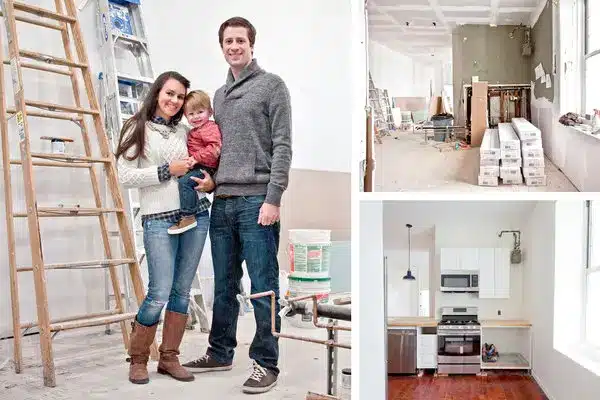Many considerations go into renting out a home or living space. You can make some extra money on the side, but you also need to take care of maintenance and ensure that your tenants follow the rules of the lease. If you have long-term tenants, one of them will eventually come up to you to ask if they can make changes around the place or even attempt a full-scale renovation.
Before you say yes or no, you need to take time to look at the scope of the project, the costs involved, and how it will affect the value of your rental. You’re going to want to keep your place attractive to future renters, so don’t take this question lightly. Here are some considerations to make before you give the go-ahead.
To Renovate or Not To Renovate

The answer to our main question is not a simple yes or no. Instead, you have to get the details of the proposed project and ask yourself if these are likely to be temporary or permanent changes. Some tenants might ask to do something minor like paint a wall or change a showerhead to a preferred model.
If it’s easy to reverse once the tenant leaves or it upgrades your rental, then consider giving your approval, especially if the tenant is going to do the work themselves.
When in doubt, turn to the lease and the security deposit they paid to rent your property. If the cost of the proposed changes is less than the deposit and can be taken out at the end of the rental period, then go for it. At the very least, this will make a happy renter, and they probably won’t give you much trouble in the future. However, if you don’t like the changes they request, then it’s okay to turn it down.
The most important thing is to have a foolproof leasing agreement that has a section that pertains specifically to renovations. At a minimum, the lease should require the tenant to come to you for written approval before they make any changes. As a landlord, you need to keep track of all changes made.
Remember that before you even rent the place out, you need to take good pictures so you can compare them to how the place looks when the renter leaves, in case they did anything without your permission.
Who Pays the Bill?
Now that you have an idea of the renovations the renter is looking to make, the next decision is who pays for the work. Again, it comes down to whether the changes are temporary or if they propose a bigger project that will benefit your property and business even after this current tenant leaves.
For instance, if they want to redo the kitchen or bathroom with updated fixtures, this could be a good investment that will help you rent the property to future clients. Plus, if the renovation fixes common rental issues like damaged drywall or old plumbing, then it is a win-win for all.
So that is the decision you have to make. If it is something small like painting a room or hanging shelves, the landlord would generally not need to pay the bill, and if they do, your maintenance costs may come out of the security deposit. However, with a larger project like a room remodel, consider the idea of splitting the costs 50/50. Of course, you will want to write up a contract with all fees and responsibilities in writing.
When calculating the final budget, factor in all potential costs that will arise when preparing for a renovation. Find the right contractors by looking at online reviews and then get a quote from them in writing. Will the project impact any other renters, and will they have to vacate the premises while the work is completed? If so, you may have to compensate them.
Don’t forget the cost of a home inspection at the end. Calculate all of these factors into the budget and proceed with the project when everyone is on the same page.
Positive Rental Renovations
There are many changes that you can make to your rental property that will make it more desirable to future renters, and if your tenant brings them up, then you should consider approving the idea. Start by looking at your floors, countertops, and plumbing. If any of it is over ten years old, then consider an upgrade.
It is easy to forget these components, but the clean look will entice potential renters. Replace carpet floors with tile, go for granite, slate, or quartz countertops, and look at chrome bathroom fixtures.
Consider going “green” with your rental property with smart additions and electronics that will save energy and show potential renters that you are a landlord who is looking to make a difference. Start by switching out all bulbs for LEDs which will reduce your carbon footprint and save on the electric bill.
Next, seal up all sides of your windows to cover cracks and prevent air leaks. A bigger project that you may go 50/50 on is installing skylights or larger windows that provide natural light, so the lamps are on less often.
You should also consider improving the front of your rental property as this is the first thing visitors see, and it will likely be the first photo they view online. If it has been a while, then a new paint job or powerwash could also revive the look of your home and driveway. Also, consider planting trees. Most realtors agree that trees improve property value, and the older they are, the better. Well-kept trees look great, and the shade they provide could cut down on air conditioning costs.
Renovations Tenants Can’t Do
When it comes to tenant renovations, landlords should be aware that certain projects must remain off-limits due to safety, legal, and structural concerns. For example, tenants should not attempt to address foundation issues, such as cracks or leaks, as these can indicate serious underlying problems that require immediate professional attention.
Attempting to fix these without proper expertise can worsen the damage or compromise the building’s stability.
Similarly, electrical work is a sensitive area where mistakes can lead to code violations, fires, or injury. Proper wiring requires strict adherence to safety protocols and color-coding standards, which untrained individuals may overlook. Faulty electrical work can lead to fires, power failures, or injuries.
Lastly, roof repairs or alterations should also be restricted, as improper handling can cause leaks, structural damage, or void warranties. Landlords should clearly communicate these restrictions to tenants to ensure the property remains safe and compliant with regulations.
In short, the question of whether to let your tenants renovate your home comes down to several factors, but if the project helps you in the long run, then consider giving your approval.

